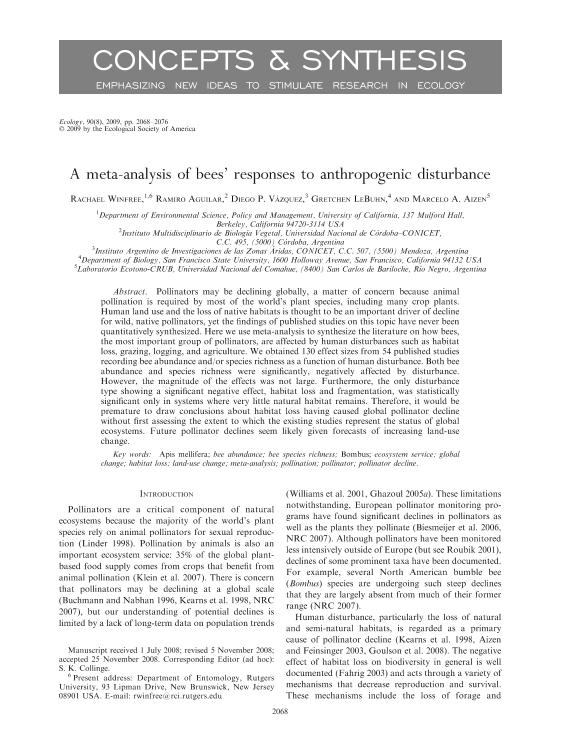Artículo
A meta-analysis of bees’ responses to anthropogenic disturbance
Fecha de publicación:
08/2009
Editorial:
Wiley
Revista:
Ecology
ISSN:
0012-9658
Idioma:
Inglés
Tipo de recurso:
Artículo publicado
Clasificación temática:
Resumen
Pollinators may be declining globally, a matter of concern because animal pollination is required by most of the world’s plant species, including many crop plants. Human land use and the loss of native habitats is thought to be an important driver of decline for wild, native pollinators, yet the findings of published studies on this topic have never been quantitatively synthesized. Here we use meta-analysis to synthesize the literature on how bees, the most important group of pollinators, are affected by human disturbances such as habitat loss, grazing, logging, and agriculture. We obtained 130 effect sizes from 54 published studies recording bee abundance and/or species richness as a function of human disturbance. Both bee abundance and species richness were significantly, negatively affected by disturbance. However, the magnitude of the effects was not large. Furthermore, the only disturbance type showing a significant negative effect, habitat loss and fragmentation, was statistically significant only in systems where very little natural habitat remains. Therefore, it would be premature to draw conclusions about habitat loss having caused global pollinator decline without first assessing the extent to which the existing studies represent the status of global ecosystems. Future pollinator declines seem likely given forecasts of increasing land-use change.
Palabras clave:
Bee Abundance
,
Bee Species Richness
,
Ecosystem Service
,
Habitat Loss
Archivos asociados
Licencia
Identificadores
Colecciones
Articulos(IMBIV)
Articulos de INST.MULTIDISCIPL.DE BIOLOGIA VEGETAL (P)
Articulos de INST.MULTIDISCIPL.DE BIOLOGIA VEGETAL (P)
Articulos(INIBIOMA)
Articulos de INST. DE INVEST.EN BIODIVERSIDAD Y MEDIOAMBIENTE
Articulos de INST. DE INVEST.EN BIODIVERSIDAD Y MEDIOAMBIENTE
Citación
Winfree, Rachel; Aguilar, Ramiro; Vazquez, Diego P.; LeBuhn, Gretchen; Aizen, Marcelo Adrian; A meta-analysis of bees’ responses to anthropogenic disturbance; Wiley; Ecology; 90; 8; 8-2009; 2068-2076
Compartir
Altmétricas




